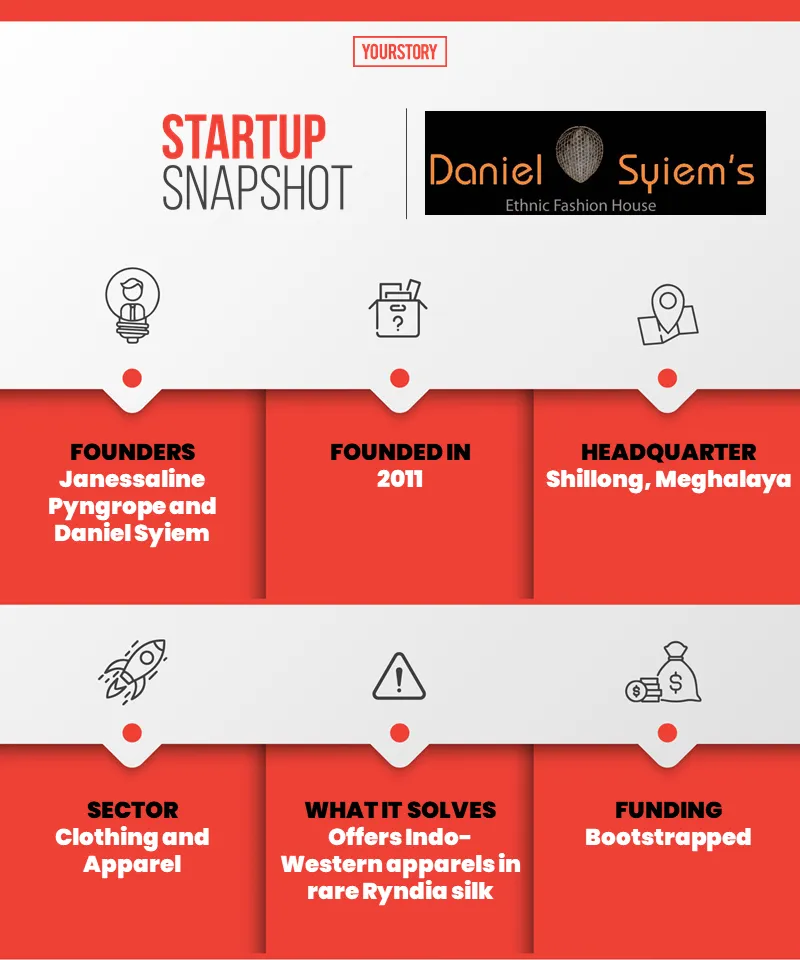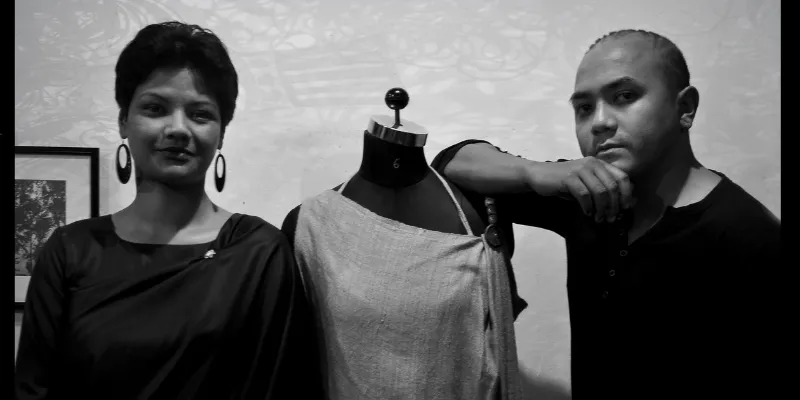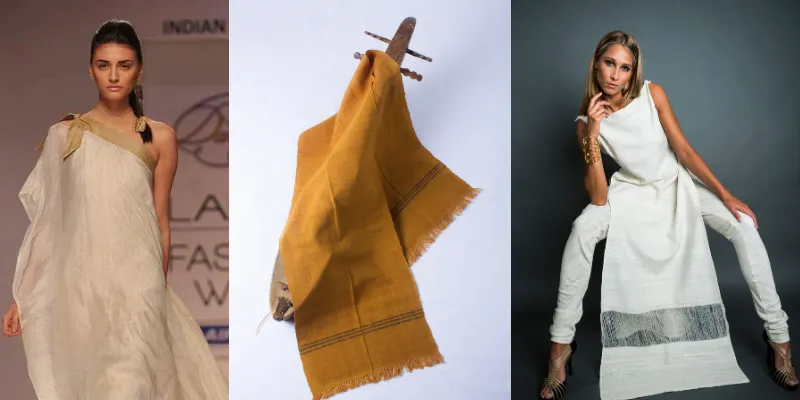How a rural development professional and fashion designer came together to revive a rare fabric from Meghalaya
Founded in 2011, Daniel Syiem’s Ethnic Fashion World is popularising Meghalaya’s Ryndia silk across the world with Indo-western designs that are priced between Rs 1,800 and Rs 50,000.
Ryndia, a rare silk fabric from Meghalaya, would not have found admirers across the world if Janessaline Pyngrope and Daniel Syiem had not sat down for a meeting in 2011.
Daniel was well-known as a fashion designer in Shillong while Janessaline was involved in rural development work, including uplifting the livelihood of traditional weavers.
The duo found common ground in Ryndia and founded the hill station’s first fashion house, Daniel Syiem's Ethnic Fashion House (DSEFH) in September 2011.

Reviving Ryndia
Common in the northeastern region of India, Ryndia is also known as an ethical or peace silk because it is one of the only silks that is extracted without killing the worm.
For Janessaline, who has been working with weavers in rural areas, the venture seemed like the best way to revive and promote the fabric.
A graduate in management education from BIMM, Pune, Janessaline vouches for the fabric as she possesses Ryndia shawls of her grandmother passed down from generations. As the business head of a fashion house, her focus is to drive sales and hopes to put Meghalaya on the world map.

Janessaline Pyngrope and Daniel Syiem
And Daniel had just the perfect creative range to carry it forward.
The duo relies on 25 spinners and weavers at a women weaver’s cooperative in the state and Daniel applies a minimalistic contemporary design to the fabric.
Priced between Rs 1,800 and Rs 50,000, the fashion house specialises in Indo-western fusion designs that feature white to earthen colours dyed using vegetable dyes.
She explains, “It does not have a glossy, bright, and loud colour that is popular in the Indian market. There are minimal embellishments of motifs and embroidery because we want to focus on the woven piece of cloth.”
Targeting women aged between 18 and 45, the business took time in finding a loyal clientele, but it has now gained visibility in India and abroad through various fashion shows. It has presented in London Fashion Week and Couture Fashion Week, New York, in 2015, and Nehru Centre, London, in 2016, among others.
The entrepreneur duo resisted selling online for the longest time as they want the customers to feel the fabric and understand its value. Customers often mistake the fabrics with khadi and other material from the pictures.
“I want people to feel and touch the fabric before they buy, educate them on the fabric, understand it, and then have them buy with pride,” she adds.
As conducting business online has become a necessity post-COVID-19, the fashion house collaborated with Ahmedabad-based Ciceroni – a hyperlocal fashion and lifestyle ecommerce platform with a storytelling approach.
The entrepreneur says starting up in the fashion industry was the last thing on her mind. “Personally, the fashion industry never really appealed to me and I still don’t have an interest in it. But working with Daniel gave me a different understanding that it goes beyond the glamour, shows, and Page-3 activities.”
The roadblocks

Designs by Shillong-based Daniel Syiem's Ethnic Fashion House
The making of Ryndia silk, from cocoon to fabric stage, is kept natural which renders low productivity.
“We do not want to use the machine and speed up the process, and that is why the authentic fabric has a niche market. And we are not able to supply in bulk. Any mismanagement to clinch extra bucks will show on the fabric,” she says. The productivity of yarn is also dependent on the weather as well as the rainfall.
Janessaline says transportation and logistics is another challenge as there is limited air and rail connectivity.
Bootstrapped so far with their savings and financial aid from friends and family, Janessaline, however, says that their funds are drying up fast. Besides the inventory cost, arranging for international trips for themselves and a few weavers to London and Geneva bore high costs.
She adds that just as returns started trickling into the business late last year, issues surrounding the Citizenship Amendment Act, and clashes between the tribal and non-tribal population in the region negatively affected their operations. COVID-19 has further added to their woes.
Women behind Ryndia
Janessaline says weaving being a women-centric industry in Meghalaya has both positive and negative implications. While it is an opportunity for them to earn money, household responsibilities hold them back from pursuing this full-time.
She says, “They cannot spend eight to ten hours weaving in a day. With great difficulty, a woman would spend two to three hours.” Beyond that, she is expected to accompany her husband to the field and tend to the children.
While they would need their husband’s permission to pursue this full-time, many men acknowledge the additional source of income which they can save.
Edited by Kanishk Singh









